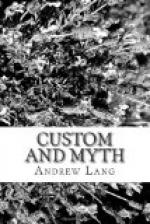Thus we need not be convinced by Mr. Max Muller that fetichism (though it necessarily has its antecedents in the human mind) is ’a corruption of religion.’ It still appears to be one of the most primitive steps towards the idea of the supernatural.
What, then, is the subjective element of religion in man? How has he become capable of conceiving of the supernatural? What outward objects first awoke that dormant faculty in his breast? Mr. Max Muller answers, that man has ’the faculty of apprehending the infinite’—that by dint of this faculty he is capable of religion, and that sensible objects, ‘tangible, semi-tangible, intangible,’ first roused the faculty to religious activity, at least among the natives of India. He means, however, by the ‘infinite’ which savages apprehend, not our metaphysical conception of the infinite, but the mere impression that there is ‘something beyond.’ ’Every thing of which his senses cannot perceive a limit, is to a primitive savage or to any man in an early stage of intellectual activity unlimited or infinite? Thus, in all experience, the idea of ‘a beyond’ is forced on men. If Mr. Max Muller would adhere to this theory, then we should suppose him to mean (what we hold to be more or less true) that savage religion, like savage science, is merely a fanciful explanation of what lies beyond the horizon of experience. For example, if the Australians mentioned by Mr. Max Muller believe in a being who created the world, a being whom they do not worship, and to whom they pay no regard (for, indeed, he has become ’decrepit’), their theory is scientific, not religious. They have looked for the causes of things, and are no more religious (in so doing) than Newton was when he worked out his theory of gravitation. The term ‘infinite’ is wrongly applied, because it is a term of advanced thought used in explanation of the ideas of men who,




